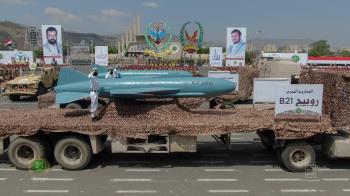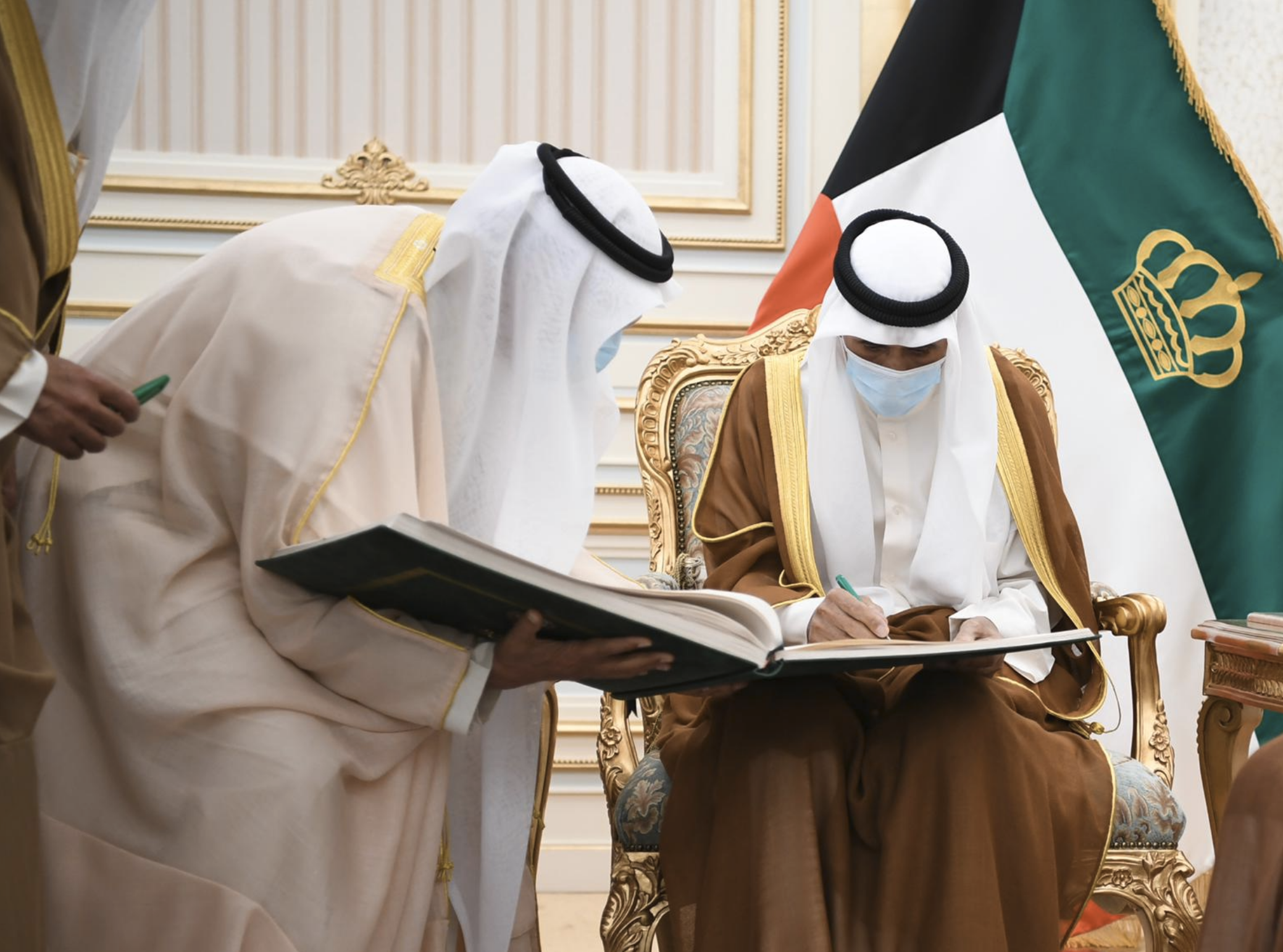Alwaght- With the death of the late Kuwaiti Emir, Sheikh Sabah al-Ahmad al-Jaber al-Sabah at the age of 91, his brother the 83-year-old crown prince of the royal family Sheikh Nawaf has been sworn in on Wednesday as Kuwait’s 16th Emir (the fifth Emir since Kuwait's independence from Britain in 1961) and took over the affairs of one of the richest countries in the world. This event is very important at the time being because of the effects it can have on both internal and regional affairs.
Kuwait, a small country with a population of 4.2 million people, is strategically located between Saudi Arabia and Iraq at the mouth of the oil-rich Persian Gulf. It sits upon one of the largest oil reserves in the world.
Sheikh Sabah, the late Emir of Kuwait (served as Emir of the Emirate since 2006 until his death), who also served as Kuwait's foreign minister from 1963 to 2003, was known for his efforts to resolve regional issues through diplomacy as well as humanitarian measures on the crises in Yemen, Syria, Iraq, Libya and Palestine, as well as plans to help Rohingya Muslims in Myanmar.
Now, Kuwait’s new leader, Sheikh Nawaf Al-Ahmad Al-Jaber Al-Sabah, comes to power at a time when Kuwait is facing a series of crises, particularly the financial crisis caused by the coronavirus outbreak and the falling of oil prices, worsening domestic political divisions and the region's inflammatory situation in competition with various regional and international powers.
Continuation of Previous Economic and Foreign Policies and Adjustments in Domestic Policy
Sheikh Nawaf, who has served as crown prince since 2006 and previously served as Minister of Interior, Labor and Social Affairs, and Defense, has been acting as head of state since July as Sheikh Sabah's illness intensified.
The new leader comes to power at a time when Kuwait is facing the highest deficit in its history due to the falling of oil prices and the spread of the coronavirus. The potential solution to the liquidity crisis, namely receiving a loan, has been dismissed by parliamentary opposition.
While Kuwait's oil and economic policies are unlikely to change during the new era, one can expect a change in the new domestic political climate under the new leadership, especially if Sheikh Nawaf proposes national reconciliation to the opposition, especially if suggested among the various factions of the ruling family.
Although Kuwait's political system allows citizens to participate in the affairs of the country more than any other Arab country located in the Persian Gulf, yet the prime minister is still appointed by the Emir, and political parties are strictly banned. Therefore, no coherent opposition exists within the country. The parliament often consists of independents and populists, and no political figures from strong, entrenched party formations are seen amongst them.
However, Sheikh Nawaf's move to meet with two longtime Kuwaiti opposition politicians, Ahmad Al-Khatib and Ahmad Al-Saadoun, indicates that the new Emir is willing to part ways with his predecessor in domestic politics. The new leader has also recently received proposals regarding political and economic reform from two opposing politicians. These meetings are on the eve of the important parliamentary elections that will be held later this year. Opponents have boycotted the elections since December 2012, when the electoral law was amended at the order of the country's former Emir. At the time, the opposition claimed that electoral law changes were designed to reduce their chances of victory.
Crisis at the Head of the Emirate: The Issue of the Successor and Tribal Equilibrium
According to the Constitution of Kuwait, with the death of the Emir, the crown prince will come to power, and the new Emir will be in charge of appointing a new crown prince. The Emir will only have a maximum time of one year to appoint the new crown prince. The new crown prince will need the majority of the parliaments vote to be in his favor in order to be approved. On paper, parliament could reject the Emir's elected choice, forcing him to submit three new candidates to be voted upon by the parliament.
In 2006, the royal family nearly collapsed due to wars being fought for the sake of attaining power by various branches capable of claiming supremacy.
With the death of Sheikh Sabah, it seems that the succession crisis will once again overshadow Kuwait, an event that had already pushed the country to the brink of a major internal crisis in 2006 due to rivalry between the al-Salem and al-Jaber branches.
In 2006, after the death of Sheikh Jaber al-Ahmad al-Sabah at the age of 78, Crown Prince Saad Al-Abdullah Al-Salim Al-Sabah, his 75-year-old cousin, understandably should have been his successor. However, he was extremely ill. His health rapidly deteriorated due to colon cancer, which he was diagnosed with in 1997, that subsequently paralyzed him to some extent (he later died in 2008).
In accordance with article 4, paragraph 3 of the Constitution of Kuwait, the new Emir, in addition to having physical health, must be sworn in before the delegates. This was something which Saad Abdullah was unable to do, however, his insistence on succession plunged Kuwait into an unprecedented political crisis. The Saad tribe then tries to force the Kuwaiti parliament speaker to set an oath date. Meanwhile, Sabah al-Ahmad al-Jaber al-Sabah, the brother of the former Emir from the Al-Jaber family branch, officially took over the parliament to remove the new Emir from the Al-Salem family branch. According to the decision made by the Council of Ministers, following an agreement between the rival tribes of the royal family whom gathered around Sheikh Sabah, on January 29, 2006, they announced him as the successor of the dying Emir, who would later reign for only ten days. Kuwait’s Constitution of 1962 and the Alternative Act of 1964 have created mechanisms for the dismissal of the Emir in the event of a physical or mental disability resulting in the Emir not being able to perform his responsibilities.
He then appointed his brother Nawaf Al-Ahmad Al-Jaber Al-Sabah as Crown Prince. This action established the dominance of the Al-Jaber family branch as an important division of the royal family.
If the introduction of succession laws had guaranteed Kuwait's stability so far, due to rivalry between members of the royal family escalating since the break of the traditional shift of the Emir in 2006, Kuwait’s stability can no longer be certain. Disagreement amongst the royal family are emerging behind closed doors, and the emergence of power struggles in the third generation of princes is an issue that cannot be ignored. They are focused around two main rivals. Former Prime Minister Nasser Mohammed Ahmad Al-Jaber Al-Sabah (2006-2010) on the one hand and his main rival, Ahmed Al-Fahad Al-Ahmed Al-Jaber Al-Sabah as the other. The first is close to the Shiites, who make up about 40 percent of Kuwaiti society, and the second close to the Popular Action Bloc of Ahmad Al-Saadoun (former speaker of parliament and leader of the opposition close to the Muslim Brotherhood).
Over the past decades, the laws of succession of the Emirates in the Persian Gulf were determined by two systems. Elected by the Royal Council or observance of the laws and customs in accordance with the Constitution. However, over the past few years, alterations have occurred regarding this issue. Events such as the Emir of Qatar stepping down in 2013 in favor of his son Sheikh Tamim, as well as breaking the tradition of transferring power among Abdulaziz's sons in Saudi Arabia since 2017 and crowning Mohammad Bin Salman, can be mentioned for such changes happening in power shifts amongst the Arab states.
In this situation, it seems that the traditional mechanisms of regulating internal competitions in the Al-Sabah House have become inefficient and paralyzed, and the Royal Council will no longer be able to impose its position as the arbiter of intra-family struggles and the guarantor of internal unity. Exclusively in 2006, for the first time in the history of the Persian Gulf and Kuwait, an elected institution was able to effectively remove one person from the throne and replace him with another.



























